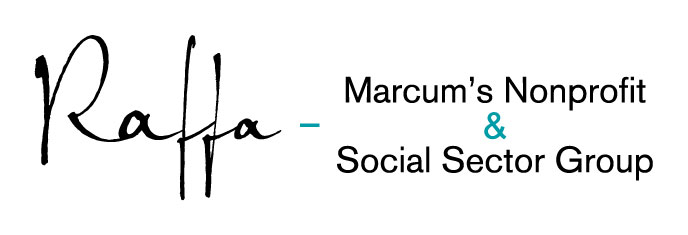IRS Guidance on Long-Awaited Qualified Transportation Fringes (QTFs) for Exempt Organizations Is Finally Here:
Raffa-Marcum’s Nonprofit & Social Sector Group Explains
Published 12-18-18
Submitted by Raffa-Marcum’s Nonprofit & Social Sector Group
 Frank H. Smith, national nonprofit tax leader of Raffa-Marcum™s Nonprofit & Social Sector Group
Frank H. Smith, national nonprofit tax leader of Raffa-Marcum™s Nonprofit & Social Sector GroupMarcum LLP informed tax exempt organizations about new IRS guidance providing clarification of a rule under the Tax Cuts and Jobs Act (TCJA) of 2017 that created unintended taxable income for many nonprofits.
Frank H. Smith, national nonprofit tax leader of Raffa-Marcum’s Nonprofit & Social Sector Group, explained, “The new guidance provides some relief for failure to make estimated tax payments, some clarity as to what type of payments are considered taxable, and definitions of important terms, as well as a way to change reserved employee parking designated areas retroactive to January 1, 2018, and an exclusion for parking spaces considered ‘primarily for the general public.’”
Background
The TCJA, signed into law in December 2017, provided sweeping changes affecting almost all businesses and individual taxpayers. One such change pertains to limitations on businesses deducting transportation fringe benefits related to employee transportation unless the employee recognizes income related to the fringe. An unexpected result of this rule could result in unintended taxable income to many exempt organizations.
While tax exempt businesses continue waiting to see if Congress will find a way to repeal this part of the Tax Cuts and Jobs Act, two IRS notices were issued in December 2018 which answered many questions regarding the tax treatment of qualified transportation fringes (QTFs).
New Guidance
Notice 2018-99 provides interim guidance for taxpayers to determine the amount of parking expenses considered to be QTF. The notice states that taxpayers may rely on any reasonable method for determining nondeductible parking expenses related to employer-provided parking until further guidance is issued.
Notice 2018-100 provides certain tax-exempt organizations that are first-time Form 990-T filers, due to the imposition of the QTF rule, a waiver of penalties for underpayment of estimated income tax payments required to be made on or before December 17, 2018.
“The interim guidance clarifies that, indeed, any amounts paid by tax exempt employers for nontaxable commuting costs of their employees, including parking, or elections by their employees to have part of their salary used on a pre-tax basis to cover such costs, does create unrelated business income to the exempt organization,” Mr. Smith said.
Some of the takeaways of the interim guidance include:
If an exempt organization pays a third party for employee parking spots, the amount up to the $260 monthly limit can qualify as a QTF and be excluded from the employee's income. However, this excess would create taxable income to the exempt organization. Any amount over the $260 would be taxable to the employee and would not be considered taxable income to the exempt organization.
If an exempt organization owns or leases all or a portion of a parking facility, the amount of the cost of the parking may be calculated using any reasonable method. However, using the value of the employee parking is not considered a reasonable method to determine cost.
The term "parking facility" includes indoor and outdoor garages, as well as parking lots and other areas where employees park on or near business premises or from which the employee commutes to work.
"Total parking expenses" include repairs, maintenance, utilities, property taxes, interest, snow, ice and leaf removal, trash removal, cleaning, parking lot attendants, security, and rent and lease payments. It does not include depreciation.
Reserved employee spots that are identified by signage or segregated by a barrier to entry is considered a disallowed parking cost and creates taxable income. Taxpayers that remove these identifications and eliminate the reserved spots prior to March 31, 2019, will be deemed to not have reserved employee spots retroactively to January 1, 2018.
If more than 50% of parking spots are primarily used by the general public, none of the costs will be considered disallowed, and no taxable income will be created for tax exempt organizations. General public includes, but is not limited to, customers, clients, visitors, patients of a healthcare facility, students of an educational institution, and congregants of a religious organization. The general public does not include employees, partners, or independent contractors of the taxpayer.
In addition to the release of these federal notices, New York State Governor Andrew Cuomo signed legislation that decoupled the New York State tax code from the federal tax rules related to QTFs, thus eliminating the requirement to consider the amount incurred or paid related to QTFs as taxable income for such exempt organizations within the state of New York.
For more information, visit www.marcumllp.com.
About Marcum
Marcum LLP is one of the largest independent public accounting and advisory services firms in the nation, with offices in major business markets throughout the U.S., as well as Grand Cayman, China, and Ireland. Headquartered in New York City, Marcum provides a full spectrum of traditional tax, accounting, and assurance services; advisory, valuation, and litigation support; managed accounting services; and an extensive portfolio of specialty and niche industry practices. The Firm serves both privately held and publicly traded companies, as well as nonprofit and social sector entities, high net worth individuals, private equity funds, and hedge funds, with a focus on middle-market companies and closely held family businesses. Marcum is a member of the Marcum Group, an organization providing a comprehensive array of professional services. For more information, visit www.marcumllp.com.
# # #
Contact:
Julie Gross Gelfand, APR
Julie.grossgelfand@marcumllp.com
(631) 414-4302

Raffa-Marcum’s Nonprofit & Social Sector Group
Raffa-Marcum’s Nonprofit & Social Sector Group
Raffa - Marcum’s Nonprofit & Social Sector Group’s strength and competitive edge lies in the fact that we provide expertise and superior service across a variety of essential interrelated financial, technology and consulting competencies. By embracing our client's vision and leveraging all of our talents, passion and resources to empower our clients, Raffa - Marcum's Nonprofit & Social Sector Group is able to fulfill its corporate mission to serve as a catalyst for positive systemic change in the community. Looking for the perfect interim CFO to help your organization address compliance requirements? Would it help to have external staff manage and provide your HR services? Would solid audit preparation, timely and accurate financial statements or new Federal Form 990 support help put your Board at ease? Is your organization ready to upgrade its accounting software or optimize its network performance? As your go-to-partner for compliance and operational excellence, Raffa - Marcum’s Nonprofit & Social Sector Group can help your organization manage all of your critical back office functions and free you up to remain focused on your mission. Services include: Accounting, Audit, Consulting, Employee Benefit Audits, Social Capital Advisory, and Tax.

